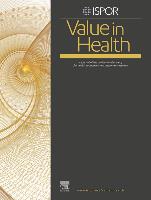New ISPOR Special Interest Group Report Reviews State of Practice
 Lawrenceville, NJ, USA—May 4, 2022—Value in Health, the official journal of ISPOR—the professional society for health economics and outcomes research, announced today the publication of an important consensus-developed report showing that while there is agreement about the importance of accounting for preference heterogeneity in discrete-choice experiments (DCEs), there is a clear need for further guidance. The report, “Accounting for Preference Heterogeneity in Discrete-Choice Experiments: An ISPOR Special Interest Group Report,” was published in the May 2022 issue of Value in Health.
Lawrenceville, NJ, USA—May 4, 2022—Value in Health, the official journal of ISPOR—the professional society for health economics and outcomes research, announced today the publication of an important consensus-developed report showing that while there is agreement about the importance of accounting for preference heterogeneity in discrete-choice experiments (DCEs), there is a clear need for further guidance. The report, “Accounting for Preference Heterogeneity in Discrete-Choice Experiments: An ISPOR Special Interest Group Report,” was published in the May 2022 issue of Value in Health.
DCEs originate from mathematical psychology and were introduced into healthcare research in the early 1990s to value benefits beyond clinical outcomes, such as treatment convenience. Since then, DCEs have become widely used as researchers and decision makers seek to understand stakeholders’ (eg, patients, caregivers, physicians) preferences for health and health-related care. Preference research is usually concerned with the trade-offs that these stakeholders are willing to make between benefits and risks of health technologies and health-related policies. These trade-offs can be used to inform a wide range of decisions, including regulatory benefit-risk assessment, resource allocation, or health policy design.
To reduce bias in the estimated trade-offs and to account for differences in perspectives, there is an increasing interest in accounting for preference heterogeneity. This is reflected in a growing portfolio of analytical methods that allow trade-offs to vary within and across stakeholder populations. Unfortunately, this large portfolio of methods is matched with little practical guidance. The number and complexity of available methods and the limited available guidance can lead to difficulties for practitioners and decision makers in making judgments about the suitability of different approaches.
In response to the challenges that arise from the current lack on guidance around preference heterogeneity, the ISPOR Health Preference Research Special Interest Group initiated this important project (co-led by Marco Boeri, PhD, RTI Health Solutions, Belfast, UK, and Sebastian Heidenreich, PhD, Evidera Inc, London, UK). The aim was to provide an overview of the current state of practice in accounting for preference heterogeneity and to assess views about different approaches among health preference researchers and methodological experts.
In brief, the research showed that there is a consensus among practitioners that accounting for preference heterogeneity in DCE data is important for the interpretation of health preference evidence. Therefore, it is no surprise that more complex analytical methods to account for heterogeneity are increasingly being used in health preference research. However, applied researchers are concerned about the growing complexity of some models, while methods experts do not share these concerns. Such differences in opinion could be due to differences in technical expertise, familiarity with approaches and their interpretation, inadequate communication about the need for sophisticated methods. Making different methods more accessible and providing clear guidance on their use could resolve this disagreement and address the concerns of health preference researchers.
“This study is the first to elicit health preference researchers’ and non-health methods experts’ opinions about preference heterogeneity in DCE data and to systematically describe methods used in the published literature to account for such heterogeneity,” said the authors. “Overall, the results of this review and survey suggest a need for pragmatic guidance on emerging good practices to assist researchers with choosing the appropriate method, conducting the research, and interpreting and reporting results,“ said the authors. “Our review confirms the expectation that the use of various analytical methods to account for preference heterogeneity has been increasing over time.”
###
ABOUT ISPOR
ISPOR, the professional society for health economics and outcomes research (HEOR), is an international, multistakeholder, nonprofit dedicated to advancing HEOR excellence to improve decision making for health globally. The Society is the leading source for scientific conferences, peer-reviewed and MEDLINE®-indexed publications, good practices guidance, education, collaboration, and tools/resources in the field.
Website | LinkedIn | Twitter (@ispororg) | YouTube | Facebook | Instagram
ABOUT VALUE IN HEALTH
Value in Health (ISSN 1098-3015) is an international, indexed journal that publishes original research and health policy articles that advance the field of health economics and outcomes research to help healthcare leaders make evidence-based decisions. The journal’s 2020 impact factor score is 5.725 and its 5-year impact factor score is 6.932. Value in Health is ranked 4th of 98 journals in health policy and services, 9th of 108 journals in healthcare sciences and services, and 24th of 376 journals in economics. Value in Health is a monthly publication that circulates to more than 10,000 readers around the world.
Website | Twitter (@isporjournals)